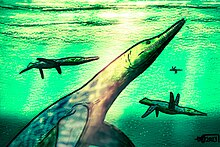| Rarosaurus Temporal range:
| |
|---|---|
|
Scientific classification
| |
| Domain: | Eukaryota |
| Kingdom: | Animalia |
| Phylum: | Chordata |
| Class: | Reptilia |
| Genus: | †
Rarosaurus Kaddumi, 2009 [1] |
| Species: | †R. singularis
|
| Binomial name | |
| †Rarosaurus singularis Kaddumi, 2009
| |
Rarosaurus is an extinct genus of marine reptile that lived during the Late Cretaceous. It contains one valid species, R. singularis, and it was found in the Muwaqqar Chalk Marl Formation of Jordan. [1]
Discovery and naming
The holotype, a partial rostrum with teeth, was discovered in the Muwaqqar Chalk Marl Formation of Jordan. [1] Hani Faig Kaddumi first mentioned this specimen in 2006, [2] and then named and described it in 2009. [1]
The generic name Rarosaurus, meaning "rare lizard", is attributed to the paucity of plesiosaur fossils where it was found, while the specific name singularis refers to the type specimen of Rarosaurus being possibly the only plesiosaur specimen found from the area. [1]
Description

Rarosaurus is known from the rostral portion of a fossil skull, which is well preserved and bears teeth. The fossil is about twenty centimetres long and very elongate. The surface of the bone is rugose, marked by small holes and grooves. The teeth are relatively short and conical; the first tooth in the jaw protrudes far forward. [1]
If the taxon is indeed a plesiosaur, it is notable for being the latest-surviving polycotylid and is currently the only one from the late Maastrichtian. [1] However, Alhalabi and colleagues questioned its identity as a plesiosaur in 2024, since the known traits of Rarosaurus are actually typcial of crocodylomorphs based on its "external bone ornamentation, tooth arrangement and implantation". [3]
References
- ^ a b c d e f g Kaddumi, H.F. (2009). "On the remains of the first plesiosaur (Reptilia: Sauropterygia) from Harrana with a description of a new genus and species of Polycotylidae". Fossils of the Harrana Fauna and the Adjacent Areas. Eternal River Museum of Natural History. pp. 158–162.
- ^ Kaddumi, H.F. (2006). "A new genus and species of gigantic marine turtles (Chelonioidea: Cheloniidae) from the Maastrichtian of the Harrana Fauna-Jordan" (PDF). PalArch's Journal of Vertebrate Palaeontology. 3 (1): 1–14.
-
^ Alhalabi, W. A.; Bardet, N.; Sachs, S.; Kear, B. P.; Joude, I. B.; Yazbek, M. K.; Godoy, P. L.; Langer, M. C. (2024). "Recovering lost time in Syria: New Late Cretaceous (Coniacian-Santonian) elasmosaurid remains from the Palmyrides mountain chain". Cretaceous Research. 159. 105871.
doi:
10.1016/j.cretres.2024.105871.
 Text was copied from this source, which is available under a
Creative Commons Attribution 4.0 International License.
Text was copied from this source, which is available under a
Creative Commons Attribution 4.0 International License.
| Rarosaurus Temporal range:
| |
|---|---|
|
Scientific classification
| |
| Domain: | Eukaryota |
| Kingdom: | Animalia |
| Phylum: | Chordata |
| Class: | Reptilia |
| Genus: | †
Rarosaurus Kaddumi, 2009 [1] |
| Species: | †R. singularis
|
| Binomial name | |
| †Rarosaurus singularis Kaddumi, 2009
| |
Rarosaurus is an extinct genus of marine reptile that lived during the Late Cretaceous. It contains one valid species, R. singularis, and it was found in the Muwaqqar Chalk Marl Formation of Jordan. [1]
Discovery and naming
The holotype, a partial rostrum with teeth, was discovered in the Muwaqqar Chalk Marl Formation of Jordan. [1] Hani Faig Kaddumi first mentioned this specimen in 2006, [2] and then named and described it in 2009. [1]
The generic name Rarosaurus, meaning "rare lizard", is attributed to the paucity of plesiosaur fossils where it was found, while the specific name singularis refers to the type specimen of Rarosaurus being possibly the only plesiosaur specimen found from the area. [1]
Description

Rarosaurus is known from the rostral portion of a fossil skull, which is well preserved and bears teeth. The fossil is about twenty centimetres long and very elongate. The surface of the bone is rugose, marked by small holes and grooves. The teeth are relatively short and conical; the first tooth in the jaw protrudes far forward. [1]
If the taxon is indeed a plesiosaur, it is notable for being the latest-surviving polycotylid and is currently the only one from the late Maastrichtian. [1] However, Alhalabi and colleagues questioned its identity as a plesiosaur in 2024, since the known traits of Rarosaurus are actually typcial of crocodylomorphs based on its "external bone ornamentation, tooth arrangement and implantation". [3]
References
- ^ a b c d e f g Kaddumi, H.F. (2009). "On the remains of the first plesiosaur (Reptilia: Sauropterygia) from Harrana with a description of a new genus and species of Polycotylidae". Fossils of the Harrana Fauna and the Adjacent Areas. Eternal River Museum of Natural History. pp. 158–162.
- ^ Kaddumi, H.F. (2006). "A new genus and species of gigantic marine turtles (Chelonioidea: Cheloniidae) from the Maastrichtian of the Harrana Fauna-Jordan" (PDF). PalArch's Journal of Vertebrate Palaeontology. 3 (1): 1–14.
-
^ Alhalabi, W. A.; Bardet, N.; Sachs, S.; Kear, B. P.; Joude, I. B.; Yazbek, M. K.; Godoy, P. L.; Langer, M. C. (2024). "Recovering lost time in Syria: New Late Cretaceous (Coniacian-Santonian) elasmosaurid remains from the Palmyrides mountain chain". Cretaceous Research. 159. 105871.
doi:
10.1016/j.cretres.2024.105871.
 Text was copied from this source, which is available under a
Creative Commons Attribution 4.0 International License.
Text was copied from this source, which is available under a
Creative Commons Attribution 4.0 International License.